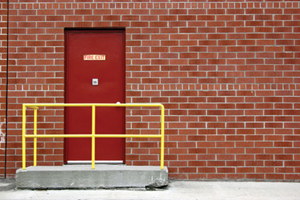Eliminating Unauthorized Fire Door Access

|
Two topics that I can never discuss enough are the reduction of violence and the use of access control and identification as a major component utilized to reduce violence. A few months ago there was another devastating shooting in the U.S.: the Aurora, Colo., movie theater shooting that killed 12 people and injured more than 50. This very unfortunate incident may not have been prevented, but some security experts feel that major changes are in store for movie theaters in the immediate future. Moviegoers may have to walk through metal detectors and endure armed security personnel screenings, and magnetically locked doors and advanced video surveillance systems will hopefully attempt to identify or deter another would-be assassin. Other experts have stated quite emphatically that there will be no changes to the movie theater industry, stating that Aurora was an isolated incident that will not be repeated. What is clear, though, is that society is changing, violence is on the rise and that change needs to occur in all walks of life in order to reduce violence.
The sobering reality is that in the majority of active shooter cases, like this one, the shooter entered the theater the night of the shooting legitimately, showing up in costume and buying a ticket. He was not an outsider, someone who stood out or could be recognized as a potential threat.
If the theater had armed security present or sophisticated electronic security would the shooting not have occurred? Or, would it have moved to a different theater with the same results? I don’t think we will ever know. The bottom line, however, is that access control and identification implemented in any venue or industry sets the stage for a sound protection program. In conjunction with a solid security assessment, access control and identification practices can reduce acts of violence.
In the case of movie theaters, a sound access control program would have included time delayed exit doors, a practice that continues to be controversial in the security industry. However, the thought of delaying egress by locking fire exits is not a practice many people feel comfortable with. Most will not attach any device to fire exit doors, or even resort to simple battery operated audible alarms, so they do not have to deal with potentially violating local fire regulations or NFPA rules. Or, most importantly, the lawsuits that could result from an obstructed fire exit during a fire. Yet, had this particular movie theater installed delayed egress locks on their fire exits, the shooting may not have occurred. But if there was a fire in the theater, people could die as a result of a delay in evaluation. Which has the highest liability? Will the theater pay out more in settlement money for death from fire or death from an active shooter?
So if the answer is not to lock fire doors, what are the alternatives that movie theaters can use to reduce the possibility of shootings? There are always battery operated audible alarms. But they tend to make a lot of noise. Additionally, after installation these devices must be checked on a regular basis.
Other options include door alarm contacts that when installed will send an alarm signal to a specific location when a door is opened. Fire doors could be observed by security video when they are unlocked or in alarm. Systems can digitally recognized and alert owners when a person is either present at a fire door on the inside of a building, when a door is opened or when someone is lurking around on the outside of the fire exit. The problem with these types of systems is that someone has to monitor them.
Additionally, the problem with all of these options is that they do not deter events; they only alert that an event is occurring. There needs to be another component to the security system. Someone has to respond and deal with the potential high-risk situation. Who would respond and would the response be timely? The theater could always hire a security officer, either armed or unarmed, but again, the police would have to be called. An off-duty police officer could be hired to handle these types of problems and would most likely be effective. But again, this is a reactive program, not a program that would restrict access.
So what is the answer to this challenging dilemma? Well, that will be up to the theater owners and the public who needs to feel safe going to the movies.
Looking for a reprint of this article?
From high-res PDFs to custom plaques, order your copy today!


